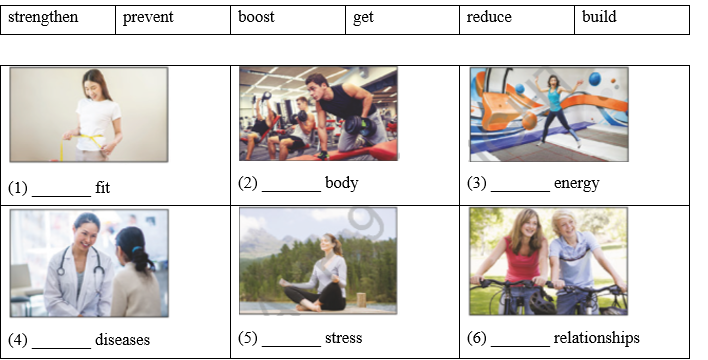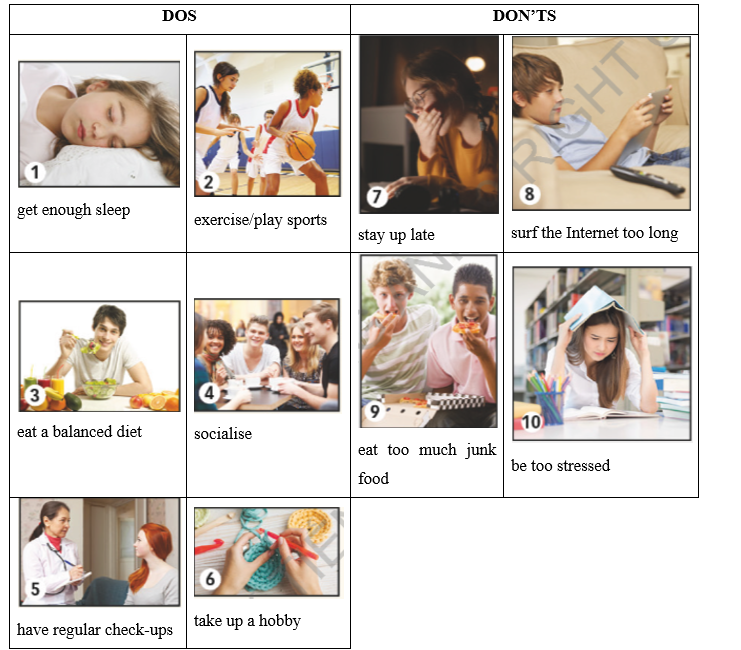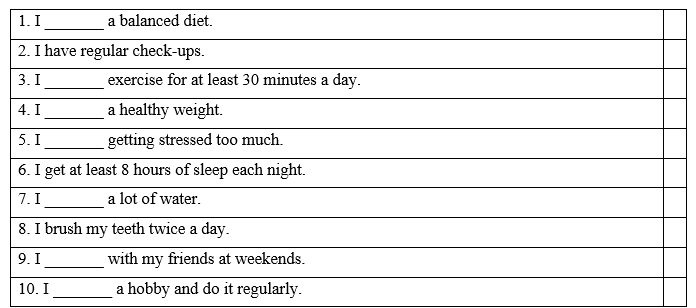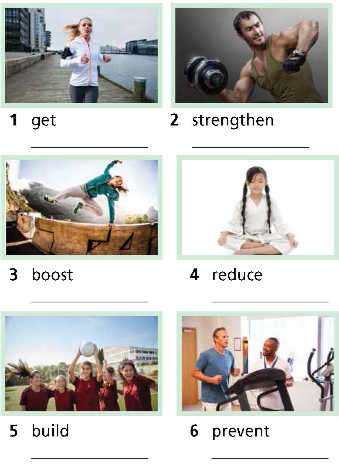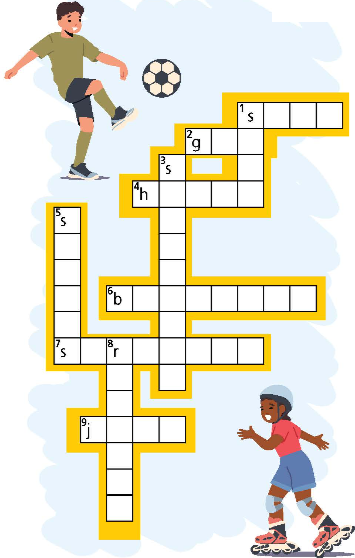Giải SGK, SBT Unit 3. Healthy lifestyles Right on!
Giải SGK, SBT Unit 3. Healthy lifestyles Right on!
3. Listen to an interview about the benefits of sports and exercise for teenagers. Decide if the statements (1-5) are R (right) or W (wrong).
(Nghe một cuộc phỏng vấn về lợi ích của thể thao và tập thể dục đối với thanh thiếu niên. Quyết định xem các câu (1-5) là R (đúng) hay W (sai).)
|
1. The interview takes place at a gym. |
|
|
2. If teenagers exercise for half an hour every day, they can get fit. |
|
|
3. Teenagers and adults eat the same amount of food. |
|
|
4. Exercising makes teenagers feel very tired. |
|
|
5. Playing tem sports helps teenagers build relationships. |
|
Bài nghe:
MC: This is Gary Vaughan with news one. I'm here at the Energy Club gym speaking to personal trainer Amy Ford. Amy How do sports and exercise benefit teenagers?
Amy: One of the top benefits is getting fit. If teenagers exercise for half an hour every day, they can see great results and get fit.
MC: But teenagers like eating a lot, which can cause weight gain, right?
Amy: It's true that teenagers eat more than children and adults, but if they play sports and exercise, they can control their weight, too.
MC: That's good, but do playing sports and exercising make teenagers feel tired?
Amy: No, in fact, it can help them boost their energy.
MC: That’s great. Another benefit you can talk about?
Amy: Yes, when teenagers play sports with a team, they can build relationships by making new friends. That's another good reason to spend time exercising.
MC: I see. Thank you for the information, Amy.
Tạm dịch:
MC: Đây là Gary Vaughan với bản tin. Tôi đang ở phòng tập của Câu lạc bộ Năng lượng để nói chuyện với huấn luyện viên cá nhân Amy Ford. amy Thể thao và tập thể dục mang lại lợi ích như thế nào cho thanh thiếu niên?
Amy: Một trong những lợi ích hàng đầu là có được thân hình cân đối. Nếu thanh thiếu niên tập thể dục nửa giờ mỗi ngày, họ có thể thấy được kết quả tuyệt vời và có được thân hình cân đối.
MC: Nhưng thanh thiếu niên thích ăn nhiều nên có thể tăng cân phải không?
Amy: Đúng là thanh thiếu niên ăn nhiều hơn trẻ em và người lớn, nhưng nếu chơi thể thao và tập thể dục, họ cũng có thể kiểm soát được cân nặng của mình.
MC: Tốt đấy, nhưng chơi thể thao và tập thể dục có khiến thanh thiếu niên cảm thấy mệt mỏi không?
Amy: Không, trên thực tế, nó có thể giúp họ tăng cường năng lượng.
MC: Thật tuyệt vời. Một lợi ích khác bạn có thể nói đến?
Amy: Đúng vậy, khi thanh thiếu niên chơi thể thao cùng một đội, họ có thể xây dựng mối quan hệ bằng cách kết bạn mới. Đó là một lý do chính đáng khác để dành thời gian tập thể dục.
MC: Tôi hiểu rồi. Cảm ơn vì thông tin, Amy.
7. Read the text again and decide if the statements (1-4) are R (right), W (wrong) or DS (doesn’t say).
(Đọc lại văn bản và quyết định xem các câu (1-4) là R (đúng), W (sai) hay DS (không nói).)
|
1. Sports and exercise can make our muscles stronger. |
|
|
2. Exercising can bring benefits to our physical health only. |
|
|
3. Doing exercise can help us sleep better. |
|
|
4. Joining a fitness club is the best way for teens to work out. |
|
|
can/may/might (Possibility) I may/might start exercising today. I can improve my health by doing exercise. (It’s possible.) should/shouldn’t (Advice) You should exercise for at least 30 minutes every day. (I advise you to.) You shouldn’t spend too much time online. (I advise you not to.) must/have to/had to (Obligation/Necessity) I must exercise every day to boost my energy. (It’s my obligation.) You have to/had to be on time for badminton practice. (It is/was a rule.) She has to/had to go jogging every day to lose weight. (It is/was necessary.) don’t have to/didn’t have to (Lack of necessity) You don’t have to pay to join the sports club; it’s free. (It isn’t necessary.) He didn’t have to go to football practise yesterday. (It wasn’t necessary.) mustn't (Prohibition) We mustn't leave our personal belongings at the gym. (It’s against the rules/laws.) |
Tạm dịch:
|
can/may/might (khả năng) Tôi có thể/có thể bắt đầu tập thể dục ngay hôm nay. Tôi có thể cải thiện sức khỏe của mình bằng cách tập thể dục. (Có thể.) should/shouldn’t (Lời khuyên) Bạn nên tập thể dục ít nhất 30 phút mỗi ngày. (Tôi khuyên bạn nên.) Bạn không nên dành quá nhiều thời gian trực tuyến. (Tôi khuyên bạn không nên.) must/have to/had to (nghĩa vụ/sự cần thiết) Tôi phải tập thể dục mỗi ngày để tăng cường năng lượng. (Đó là nghĩa vụ của tôi.) Bạn phải/phải đến đúng giờ để tập cầu lông. (Đó là/đã là một quy tắc.) Cô ấy phải/phải chạy bộ mỗi ngày để giảm cân. (Nó là/cần thiết.) don’t have to/didn’t have to (Thiếu cần thiết) Bạn không phải trả tiền để tham gia câu lạc bộ thể thao; nó miễn phí. (Nó không cần thiết.) Hôm qua anh ấy không phải đi tập bóng đá. (Nó không cần thiết.) mustn't (Cấm) Chúng ta không được để đồ đạc cá nhân ở phòng tập. (Nó trái với các quy tắc/luật.) |
1. Choose the correct options.
(Chọn những lựa chọn đúng.)
1. I must/mustn’t work out regularly to have good physical and mental health.
2. I may/must go swimming after after school tomorrow. I’ll think about it.
3. You shouldn’t/don’t have to exercise right after eating a big lunch.
4. Mike mustn’t/didn’t have to buy new running shoes; he already had some.
5. Neil had to/should walk in the rain after football practice yesterday.
6.
A: I might/have to go swimming this afternoon. I’m thinking about that.
B: But, you mustn’t/don’t have to swim in the pool a swimming suit. Let’s buy one first.
7.
A: Can I/Do I have to buy a membership for a fitness class at the community centre?
B: No, you mustn’t/don’t have to pay for those classes.
Modals
|
can/be able to; can’t/not be able to (General ability in the present) She can/is able to lay basketball very well. He can’t/isn’t able to finish a 2000-metre race. It’s too tiring for him. could/be able to; couldn’t/not be able to (Ability in the past) He could/was able to/couldn’t/wasn’t able to ride a bike when he was six. They couldn’t/weren’t able to win the football match because they didn’t practise much. was able to (Specific ability in the past in a particular situation) John had a headache, but he was able to finish his workout. |
Tạm dịch:
|
can/be able to; can’t/not be able to (Khả năng chung ở hiện tại) Cô ấy có thể/có khả năng chơi bóng rổ rất giỏi. Anh ấy không thể/không thể hoàn thành cuộc đua 2000 mét. Nó quá mệt mỏi đối với anh ấy. could/be able to; couldn’t/not be able to (Khả năng trong quá khứ) Anh ấy có thể/có thể/không thể/không thể đi xe đạp khi anh ấy sáu tuổi. Họ không thể/không thể thắng trận bóng đá vì họ không luyện tập nhiều. was able to (Khả năng cụ thể trong quá khứ trong một tình huống cụ thể) John bị đau đầu nhưng anh ấy vẫn có thể hoàn thành bài tập của mình. |
4. Fill in each gap with can, could or be able to in the correct form. Some sentences have two possible answers.
(Điền vào mỗi chỗ trống với can, could hoặc be could ở dạng đúng. Một số câu có thể có hai câu trả lời.)
1. Duy _______ play rugby. He doesn’t know the rules.
2. My grandma _______ ice skate when she was young.
3. I _______ play tennis well, but I’m better at playing football.
4. Bob _______ attend badminton practice last night because he had to study.
5. Jeremy had an injury during the basketball game, but he _______ finish it.
1. Read the dialogue and fill in the gaps (1-4) with the sentences (A-D). Listen and check.
(Đọc đoạn hội thoại và điền vào chỗ trống (1-4) bằng các câu (A-D). Nghe và kiểm tra.)
|
A. How can it help? (Nó có thể giúp ích như thế nào?) B. Do you have any other tips? (Bạn có lời khuyên nào khác không?) C. Do you have any advice for me? (Bạn có lời khuyên nào dành cho tôi không?) D. Thanks for your advice. (Cảm ơn lời khuyên của bạn.) |
Sonya: I really want to have a healthier lifestyle. (1) __________________________________
Tony: Sure! First, you should eat a balanced diet.
Sonya: OK. How useful is it?
Tony: If you do that, it can help you manage your weight.
Sonya: That’s great! Is there anything else I should do?
Tony: Yes. You should exercise for at least 30 minutes a day.
Sonya: (2) __________________________________
Tony: It can strengthen your body and boost your energy.
Sonya: Is there anything I shouldn’t do?
Tony: Yes. You shouldn’t stay up late.
Sonya: Really? Why?
Tony: Staying up late can cause stress and some diseases.
Sonya: I see.
Tony: Yes. You shouldn’t surf the Internet for too long because it may be harmful to your eyes.
Sonya: Wow! There are lots of ways to have a healthy lifestyle. (4) ________________________
Tony: You’re welcome. I hope it helps.
Bài nghe:
Sonya: I really want to have a healthier lifestyle. Do you have any advice for me?
Tony: Sure! First, you should eat a balanced diet.
Sonya: OK. How useful is it?
Tony: If you do that, it can help you manage your weight.
Sonya: That’s great! Is there anything else I should do?
Tony: Yes. You should exercise for at least 30 minutes a day.
Sonya: How can it help?
Tony: It can strengthen your body and boost your energy.
Sonya: Is there anything I shouldn’t do?
Tony: Yes. You shouldn’t stay up late.
Sonya: Really? Why?
Tony: Staying up late can cause stress and some diseases.
Sonya: I see. Do you have any other tips?
Tony: Yes. You shouldn’t surf the Internet for too long because it may be harmful to your eyes.
Sonya: Wow! There are lots of ways to have a healthy lifestyle. Thanks for your advice.
Tony: You’re welcome. I hope it helps.
3. Act out a similar dialogue. Use the dialogue in Exercise 1 as a model and the ideas below and/or your own ideas.
(Diễn lại một đoạn hội thoại tương tự. Sử dụng đoạn hội thoại trong Bài tập 1 làm mẫu và các ý dưới đây và/hoặc ý của riêng bạn.)
|
DOs |
- get enough sleep - fell relaxed, improve health (ngủ đủ giấc - thư giãn, cải thiện sức khỏe) - socialise - have new friends, feel happy (giao lưu - có bạn mới, cảm thấy vui vẻ) |
|
DON’Ts |
- eat too much junk food - gain weight, get some diseases (ăn quá nhiều đồ ăn vặt - tăng cân, mắc một số bệnh) - be too stressed - become ill, feel unhappy (quá căng thẳng - bị ốm, cảm thấy không vui) |
|
We can use a model verb (must, can, may, might or should) in the main clause of a comditional type 1 sentence. If + Present Simple, must/can/may/might/should + infinitive without to If we want to keep fit, we must eat a balanced diet. You can improve your mood if you usually socialise with your friends. If he practises football every day, he may/might join the school team. We shouldn’t eat junk food if we want to lose weight. |
Tạm dịch:
|
Chúng ta có thể sử dụng động từ mẫu (must, can, may, might hoặc nên) trong mệnh đề chính của câu điều kiện loại 1. If + Hiện tại đơn, must/can/may/might/ Should + nguyên mẫu không có to Nếu chúng ta muốn giữ dáng, chúng ta phải ăn một chế độ ăn uống cân bằng. Bạn có thể cải thiện tâm trạng của mình nếu thường xuyên giao lưu với bạn bè. Nếu anh ấy tập bóng đá hàng ngày, anh ấy có thể/có thể tham gia đội tuyển của trường. Chúng ta không nên ăn đồ ăn vặt nếu muốn giảm cân. |
1. Match the if-clause (1-6) to the main clauses (a-f) to make meaningful sentences.
(Nối mệnh đề if (1-6) với mệnh đề chính (a-f) để tạo thành câu có nghĩa.)
If you want to strengthen your muscles, (1) (a) you might not win the final match.
If you want to manage your weight, (2) (b) you can feel energetic the next day.
If you get enough sleep, (3) (c) you must practise hard every day.
If you only practise tennis once a week, (4) (d) you should life weights regularly.
If you don’t want to be tired, (5) (e) you can’t eat too much junk food.
If you plan to win the football match, (6) (f) you shouldn’t stay up late the night before.
Phrasal verbs
|
. A phrasal verb consists of a verb with a preposition or an adverb. The meaning of a phrasal verb is different from the meanings of its separate parts. You should give up junk food to lose weight. Common phrasal verbs: carry out, get up, give away, give up, go on, hang out, look after, look for, look out, look up, pick up, put on, take off, take up, throw away, try on, turn on, turn off, work out, etc. . When the object of the phrasal verb is a noun, it goes before/after the preposition/adverb. I looked up the word online. (I looked the word up online.) . When the object of the phrasal verb is a pronoun, it goes after the verb and before the preposition/adverb. I looked it up online. (I look up it online.) |
Tạm dịch:
|
. Một cụm động từ bao gồm một động từ có giới từ hoặc trạng từ. Ý nghĩa của cụm động từ khác với ý nghĩa của các phần riêng biệt của nó. Bạn nên từ bỏ đồ ăn vặt để giảm cân. Các cụm động từ thông dụng: carry out, get up, give away, give up, go on, hang out, look after, look for, look out, look up, pick up, put on, take off, take up, throw away, try on, turn on, turn off, work out, etc. . Khi tân ngữ của cụm động từ là một danh từ, nó đi trước/sau giới từ/trạng từ. Tôi đã tra cứu từ này trên mạng. (Tôi đã tra cứu từ này trên mạng.) . Khi tân ngữ của cụm động từ là một đại từ, nó sẽ đứng sau động từ và trước giới từ/trạng từ. Tôi đã tra cứu nó trên mạng. (Tôi tra cứu nó trực tuyến.) |
3. Read the text again and decide if the statements (1-5) are R (right), W (wrong) or DS (doesn’t say).
(Đọc lại văn bản và quyết định xem các câu (1-5) là R (đúng), W (sai) hay DS (không nói).)
|
1 |
The main source of energy for the body is glucose |
|
|
2 |
Eating too many carbs can lead to weight problems. |
|
|
3 |
Protein is important for athletes only. |
|
|
4 |
Our bodies can store more vitamins than minerals. |
|
|
5 |
We lose water through breathing. |
|
5. Listen and repeat. Match the names of food groups (1-5) to the parts (a-e) in the picture.
(Lắng nghe và lặp lại. Nối tên các nhóm thực phẩm (1-5) với các phần (a-e) trong hình.)
|
The Eatwell Guide 1. fruit and vegetables 2. starchy foods (carbs) 3. fatty and sugary foods & drinks 4. protein 5. dairy products |
 |
Bài nghe:
1. fruit and vegetables (trái cây và rau quả)
2. starchy foods (carbs) (thực phẩm giàu tinh bột (carbs))
3. fatty and sugary foods & drinks (Đồ ăn thức uống nhiều chất béo và đường)
4. protein (chất đạm)
5. dairy products (sản phẩm từ sữa)
7. Listen to an interview about steps to have a healthy diet and complete the gaps (1-5). Write NO MORE THAN TWO WORDS for each gap.
(Nghe một cuộc phỏng vấn về các bước để có một chế độ ăn uống lành mạnh và hoàn thiện các khoảng trống (1-5). Viết KHÔNG QUÁ HAI TỪ cho mỗi chỗ trống.)
|
Steps to a Healthy Diet |
||
|
Planning and Shopping |
Preparing Healthy Food |
Changing your Eating Habits |
|
- plan a menu before shopping - only buy what you need (lots of fruit, vegetables and (1) _______) - buy fewer starchy and fatty foods. |
- boil and steam (2) _______ and meat instead of frying or grilling - use cooking spray instead of (3) _______ or butter |
- replace (4) _______ with healthier options - eat (5) _______ instead of sugary foods and drinks |
Bài nghe:
MC: Hello, you're listening to a health talk with nutritionist Alex Wayne. Alex, if the listeners want a healthy diet, What should they do?
Alex: Great question. The first step to a healthy diet involves planning and shopping. You should plan a menu before you go to the supermarket and only buy what you need, including lots of fruit, vegetables, and fish, and fewer starchy or fatty foods.
MC: That sounds great. What about the way we prepare food?
Alex: There are lots of tips for preparing food in a healthier way. You can boil or steam vegetables instead of frying or grilling them. You can use cooking spray instead of oil or butter to reduce fat in cooking, too.
MC: Those are excellent tips, but a healthy diet isn't just about what we try. It's also about what we don't eat.
Alex: You’re right. The final step to a healthy diet is changing your eating habits. You should avoid junk food and replace it with healthier options. For instance, if you really like sweets, you can eat fruit instead of sugary foods and drinks.
MC: Thank you for your advice.
Tạm dịch:
MC: Xin chào, các bạn đang nghe buổi nói chuyện về sức khỏe với chuyên gia dinh dưỡng Alex Wayne. Alex, nếu thính giả muốn có một chế độ ăn uống lành mạnh thì họ nên làm gì?
Alex: Câu hỏi hay. Bước đầu tiên để có một chế độ ăn uống lành mạnh liên quan đến việc lập kế hoạch và mua sắm. Bạn nên lên thực đơn trước khi đi siêu thị và chỉ mua những thứ mình cần, bao gồm nhiều trái cây, rau củ, cá và hạn chế thực phẩm giàu tinh bột hoặc chất béo.
MC: Nghe tuyệt đấy. Còn cách chúng ta chuẩn bị thức ăn thì sao?
Alex: Có rất nhiều mẹo để chế biến thức ăn theo cách lành mạnh hơn. Bạn có thể luộc hoặc hấp rau củ thay vì chiên, nướng. Bạn cũng có thể sử dụng bình xịt nấu ăn thay cho dầu hoặc bơ để giảm mỡ trong nấu nướng.
MC: Đó là những lời khuyên tuyệt vời, nhưng một chế độ ăn uống lành mạnh không chỉ là những gì chúng ta cố gắng. Đó cũng là về những gì chúng ta không ăn.
Alex: Bạn nói đúng. Bước cuối cùng để có một chế độ ăn uống lành mạnh là thay đổi thói quen ăn uống của bạn. Bạn nên tránh đồ ăn vặt và thay thế bằng những lựa chọn lành mạnh hơn. Ví dụ, nếu bạn thực sự thích đồ ngọt, bạn có thể ăn trái cây thay vì đồ ăn và đồ uống có đường.
MC: Cảm ơn lời khuyên của bạn.
Writing (A paragraph about a healthy lifestyle)
Task analysis
1. Read the task and complete the table.
(Đọc bài và hoàn thành bảng.)
Your school magazine wants its readers to send in a paragraph suggesting ways to have a healthy lifestyle (about 100-120 words). Include a topic introduction, suggestions and explanations and a conclusion. (Tạp chí trường học của bạn muốn độc giả gửi một đoạn gợi ý những cách để có lối sống lành mạnh (khoảng 100-120 từ). Bao gồm phần giới thiệu chủ đề, gợi ý, giải thích và kết luận.)
|
Type of text (Loại văn bản) |
|
|
Readers (Độc giả) |
|
|
Topic (Chủ đề) |
|
|
Number of words (Số từ) |
|
|
What to include (Những gì cần bao gồm) |
|
2. Read the paragraph. In which part (1-3) does the writer …?
(Đọc đoạn văn. Ở phần nào (1-3) người viết viết…?)
|
a |
|
introduce the topic (giới thiệu chủ đề) |
|
b |
|
give a conclusion (đưa ra kết luận) |
|
c |
|
give suggestions and explanations (đưa ra gợi ý và giải thích) |
Ways to have a healthy lifestyle
(1) There are some ways to have a healthy lifestyle.
(2) First, you should eat a balanced diet because it can help you manage your weight. Second, you should play sports or exercise for at least 30 minutes a day, The reason for this is that sports or exercise can boost your energy and strengthen your body. Finally, you should get at least 8 hours of sleep a night. If you do that, you will feel relaxed and avoid some diseases. (3) In conclusion, to have a healthy lifestyle, you should have a balanced diet, play sports or exercise and get enough sleep.
|
Writing Tip: Giving explanations When we give suggestions, we can give explanations to support our ideas. (Khi đưa ra gợi ý, chúng ta có thể đưa ra những lời giải thích để hỗ trợ cho ý tưởng của mình.) |
|
Useful Language Introducing the topic - There are some/several ways to have a healthy lifestyle. - You can live a healthy in several/some ways. Giving suggestions and explanations - First(ly),/Second(ly),/Third(ly),/Also,/Finally. … - You should/shouldn’t … because …. - In this way,/If you do that, you can …. - The reason for this is that … - This is because … Giving a conclusion - In a word,/To sum up,/In conclusion,/In the end,/After all, …. |
Tạm dịch:
|
Ngôn ngữ hữu dụng Giới thiệu chủ đề - Có một số/một số cách để có một lối sống lành mạnh. - Bạn có thể sống khỏe mạnh bằng nhiều cách. Đưa ra gợi ý và giải thích - Thứ nhất(ly),/Thứ hai(ly),/Thứ ba(ly),/Ngoài ra,/Cuối cùng. … - Bạn nên/không nên…bởi vì…. - Bằng cách này,/Nếu bạn làm như vậy, bạn có thể…. - Lý do là vì… - Đó là vì… Đưa ra kết luận - Trong một lời,/Tóm lại,/Tóm lại,/Cuối cùng,/Sau tất cả, … |
7. Listen to an interview about eating a balanced diet. Decide if the statements (1-5) are R (right) or W (wrong).
(Nghe một cuộc phỏng vấn về việc ăn một chế độ ăn uống cân bằng. Quyết định xem các câu (1-5) là R (đúng) hay W (sai).)
|
1. Dr Cooper is a nutrition expert. |
|
|
2. There are lots of vitamins and minerals in fruit and vegetables. |
|
|
3. Protein is especially important for teens and children. |
|
|
4. We should give up carbs to have a healthy diet. |
|
|
5. Sugary foods and drinks can cause weight problems. |
|
Bài nghe:
MC: Good afternoon. On the show today is nutrition expert Dr. Francis Cooper. He's going to give our listeners some advice about eating a balanced diet. Welcome, Dr. Cooper.
Dr. Cooper: Thank you.
MC: So what's the most important thing to remember about healthy food?
Dr. Cooper: The most important thing to do every day is eat fruit and vegetables.
MC: And how does it help our body?
Dr. Cooper: Well, fruit and vegetables have lots of the vitamins and minerals. Our bodies need most.
MC: I see. What are the tips you have?
Dr Cooper: Yes, we all need protein to help our bodies build and repair bones and muscles. It is especially important for children and teens because they are growing.
MC: Some people believe that we shouldn't eat any carbs for a healthy diet. What do you think?
Dr. Cooper: We should eat carbs because they are the main source of energy for our body.
MC: interesting. Is there anything we should avoid in our diet?
Dr. Cooper: We should avoid sugary foods and drinks; they can make it hard to manage our weight.
MC: Thank you for the advice, Dr. Cooper.
8. Choose the correct options (A,B,C or D).
(Chọn các phương án đúng (A,B,C hoặc D).)
|
Why is sleep so important for teens? Hi, everyone! We know that sleep is important, but did you know it’s more important for teenagers? I’ll tell you about some of the benefits of getting enough sleep. First, sleep has an effect on your studies. (1) _______ I get a good night’s sleep, I can concentrate on my lessons and do my homework better. You may get similar results if you go to bed earlier at night. Second, (2) _______ well can improve teens’ health, too. This is because our bodies repair and build muscles while we sleep. It’s so important that teenagers get enough rest because our are still (3) _______. Finally, it’s good for teens to get enough sleep for our emotional (4) _______. In my view, this is the most important benefit. This is because if we feel bad, we may have problems in all other areas of our lives. So, you should get enough sleep if you (5) _______ to be a healthy, happy and good student. The benefits are pretty clear, don’t you think? |
1. A. Although B. If C. Before D. While
2. A. sleep B. to sleep C. sleeping D. slept
3. A. rising B. developing C. increasing D. growing
4. A. health B. healthy C. healthily D. unhealthily
5. A. plan B. decide C. agree D. want
9. Match the sentences (1-5) to (a-e) to make exchanges.
(Nối các câu (1-5) với (a-e) để trao đổi.)
|
1 |
|
Do you have any advice for me? |
|
2 |
|
How can it help? |
|
3 |
|
Do you have any other tips? |
|
4 |
|
Thanks for your advice. |
|
5 |
|
You shouldn’t eat a lot of sugary and fatty foods. |
a. Yes. You shouldn’t stay up late.
b. It can strengthen your body and boost your energy.
c. Sure! First, you should work out for at least 30 minutes every day.
d. Really? Why?
e. You’re welcome. I hope it helps.
3. Complete the text with the words from the list.
(Hoàn thành văn bản với các từ trong danh sách.)
|
mental |
physical |
boost |
reduce |
|
strengthen |
get |
maintain |
work |
Capoeira
Do you want to 1) _______ out, but you do not like playing sports? Then try capoeira. It is a martial art from Brazil that people practise to the sound of singing and drums. However, Capoeira is not dancing it is a difficult workout that can improve your 2) ________ health. It helps you 3) _______ your body, burn calories and 4) _______ a healthy weight. Capoeira is a great way to 5) _________ fit, but it is also good for your 6) _________ health. Like any physical activity, it can 7) _______ stress, so it is great for people that have a lot to do at work, school or college. Capoeira is hard work, but many people do not feel tired after a class because the exercise and fast music help 8) _______ their energy.
2. Complete the table with phrases from Exercise 1.
(Hoàn thành bảng với các cụm từ từ Bài 1.)
|
Dos |
Don’ts |
|
___________ ___________ ___________ |
___________ ___________ ___________ |
Asking for/Giving advice on a healthy lifestyle
(Hỏi ý kiến/ Cho lời khuyên về lối sống lành mạnh)
1. Match the sentences to make exchanges.
(Nối các câu để tạo thành câu đối đáp.)
|
1. Do you have any advice for me? 2. You shouldn't eat too much junk food. 3. How can it help? 4. Thanks for your advice. |
a. You're welcome. b. It can strengthen your body. c. Sure! First, you should work out every day. d. Really? Why? |
Modals in conditional type 1
(Động từ khuyết thiếu trong câu điều kiện loại 1)
1. Match the if-clauses (1-5) to the main clauses (a-e) to make meaningful sentences.
(Nối các mệnh đề if (1-5) với mệnh đề chính (a-e) để tạo thành các câu có nghĩa.)
|
1. If you want to avoid injuries, 2. If you see Sue, 3. If you want to lose weight, 4. If you finish housework early, 5. If you want to win the match, |
a. you can watch a movie. b. you must stop eating fatty food. c. you might practise every day. d. you should do a warm-up. e. you may notice something different about her. |
1. Read the text and complete the gaps (1-5) with the words from the list.
(Đọc văn bản và hoàn thành chỗ trống (1-5) với các từ trong danh sách.)
|
fit exercising energy improve make |
TOP REASONS
Why We Should Exercise!
Do you know why sports and exercise are good for us?
Firstly, sports and exercise can 1) _________ your looks and your mood. That is because working out is a great way to maintain a healthy weight and when you look good, you will feel good. 2) _________for 30 minutes each day also helps you reduce stress. This is because your brain releases feel-good chemicals when you work out. Therefore, if you're unhappy, getting some fresh air by taking a stroll or riding your bike will make you feel better. Also, joining a sports team is an excellent way to build relationships and 3) _________ new friends.
Secondly, there are other health benefits for our bodies besides getting 4) _________. Our bodies can become stronger through sports and exercise, which boosts 5) _________ levels. Also, physical activities can lower the chance of cancer and heart disease because they control our weight and strengthen our bodies. Regular physical activities can help you have a deep sleep, too. Just don't exercise too close to bedtime, or you may have too much energy to go to sleep.
CÁC BÀI TẬP KHÁC


